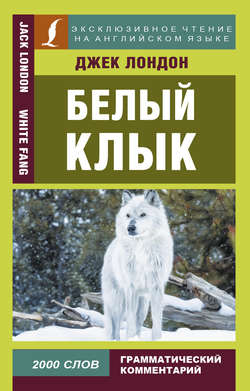Читать книгу Белый Клык / White Fang - Джек Лондон, William Hootkins - Страница 9
White Fang
by Jack London
Part II
Chapter V. THE LAW OF MEAT
ОглавлениеThe cub’s development was rapid. He rested for two days, and then went out from the cave again. But on this trip he did not get lost. When he grew tired, he found his way back to the cave and slept. And every day after that he was ranging a wider area.
He began to understand his strength and his weakness, and to know when to be bold and when to be cautious.
He never forgot and was always ready to revenge the hurts by the ptarmigan and or the weasel. He studied their habits.
In the matter of meat, his luck had been all in the beginning. The seven ptarmigan chicks and—later—the baby weasel were the sum of his killings. His desire to kill strengthened with the days. He wanted a squirrel. But as birds flew in the air, squirrels could climb trees, and the cub could only try to crawl upon the squirrel when it was on the ground.
The cub had a great respect for his mother. She could get meat, and she never failed to bring him his share. She was unafraid of things. His mother represented power; besides, the older he grew the shorter grew her temper.
Once his mother brought strange meat. He didn’t know it was a lynx’s kitten, nor did he know the desperateness of what his mother did. He only knew it was meat.
With a full stomach, the cub lay in the cave, sleeping against his mother’s side. He was woken by her snarling. Possibly in her whole life it was the most terrible snarl she ever gave. There was reason for it, and none knew it better than she. In the afternoon light, crouching in the entrance of the cave, the cub saw the lynx-mother. He bristled.
Because of the low-roofed entrance the lynx could not go in, and, when she tried to, the she-wolf sprang upon her and threw her down. The cub saw little of the battle. There was an awful snarling. The two animals fought, the lynx ripping and tearing with her claws and using her teeth as well, while the she-wolf used only her teeth.
Once, the cub sprang in and sank his teeth into the hind leg of the lynx. He clung on, growling savagely, and thus probably saved his mother. The lynx’s huge fore-paw ripped his shoulder open to the bone. The fight lasted so long that he had time to cry himself out and to experience a second burst of courage; and in the end he was again clinging to a hind-leg and furiously growling between his teeth.
The lynx was dead. But the she-wolf was very weak and sick. For a week she never left the cave, except for water, and then her movements were slow and painful. At the end of that time they ate the lynx, while the she-wolf’s wounds had healed.
The cub’s shoulder was stiff and sore. But the world now seemed changed. He now had greater confidence. He had fought; he had buried his teeth in the flesh of an enemy; and he had survived. And because of all this, he carried himself more boldly.
He began to accompany his mother on the meat-trail, and he saw much of the killing of meat and began to play his part in it. And he learned the law of meat. There were two kinds of life—his own kind and the other kind. His own kind included his mother and himself. The other kind included all live things that moved. But the other kind was divided. One portion was composed of the non-killers and the small killers. The other portion killed and ate his own kind, or was killed and eaten by his own kind. And out of this classification came the law. The aim of life was meat. Life itself was meat. Life lived on life. There were the eaters and those who were the eaten. The law was: EAT OR BE EATEN. He did not formulate the law; he merely lived the law without thinking about it at all.
He saw the law operating around him on every side. He had eaten the ptarmigan chicks. The hawk had eaten the ptarmigan-mother. The hawk would also have eaten him. Later, when he had grown, he wanted to eat the hawk. He had eaten the lynx kitten. The lynx-mother would have eaten him had she not herself been killed and eaten. And so it went.
The cub did not think in man-fashion. He was single-purposed, and had but one thought or desire at a time. Besides the law of meat, there were other and lesser laws for him to learn and obey. The world was filled with surprise. The life that was in him, the play of his muscles, was happiness. To run down[25] meat was to experience happiness. His battles were pleasures. Terror itself, and the mystery of the unknown, led to his living.
And there were satisfactions. To have a full stomach, to lay lazily in the sunshine—such things were remuneration. They were expressions of life, and life is always happy when it is expressing itself. So the cub had no quarrel with his hostile environment. He was very much alive, very happy, and very proud of himself.
25
to run down – загнать, настигнуть
